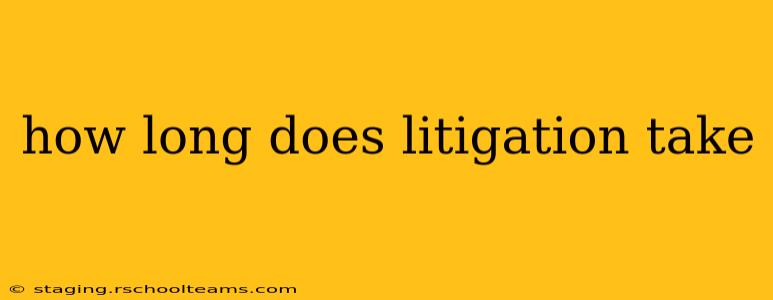Litigation, the process of resolving disputes through the court system, is notoriously unpredictable when it comes to timelines. The duration of a lawsuit can vary dramatically depending on several factors, making it impossible to give a definitive answer to the question "How long does litigation take?" However, understanding these factors allows you to better anticipate the potential length of your own case.
Factors Affecting the Length of Litigation
Several key factors significantly influence how long a lawsuit might take:
-
Complexity of the Case: Simple cases involving straightforward facts and clear legal issues tend to resolve much faster than complex cases with numerous parties, intricate factual scenarios, or novel legal questions. Cases involving extensive discovery (the process of gathering evidence) or expert testimony often take considerably longer.
-
Court Congestion: Court dockets are often overloaded, resulting in delays in scheduling hearings, trials, and other procedural steps. The specific court's backlog significantly impacts the timeline. Courts in larger cities or those with limited resources may experience longer delays.
-
Cooperation of Parties: Cases where parties are willing to cooperate and engage in good-faith negotiations often proceed more efficiently. Conversely, when parties are uncooperative or engage in delaying tactics, the process can be protracted significantly.
-
Type of Case: Different types of cases have different procedural timelines. For example, a straightforward breach of contract claim will generally move faster than a complex class-action lawsuit or a multi-million dollar business dispute.
-
Legal Representation: Experienced legal counsel can streamline the process, accelerating settlements or efficiently navigating court procedures. Conversely, inexperienced or unprepared attorneys can inadvertently prolong the litigation.
-
Discovery Process: This crucial phase, involving the exchange of documents and information between parties, can be lengthy and complex. Disputes over discovery requests or motions to compel discovery further contribute to delays.
-
Settlement Negotiations: Many cases resolve through settlement before trial. The willingness of the parties to negotiate and compromise significantly impacts the overall duration. Successful negotiation can substantially shorten the litigation process.
-
Appeals Process: If either party appeals a court's decision, the process extends considerably, adding months or even years to the overall timeline.
How Long Does Litigation Take in Different Types of Cases?
While precise timelines are impossible to predict, here are some general observations:
-
Simple Civil Cases: These might conclude within a few months to a year, often resolving through settlement.
-
Complex Commercial Litigation: These cases can drag on for several years, sometimes even a decade or more, particularly if they involve extensive discovery, expert witnesses, and appeals.
-
Family Law Cases (Divorce, Custody): These can vary widely, but often take several months to a couple of years, depending on the complexity of property division, custody arrangements, and other factors.
-
Criminal Cases: The timeline for criminal cases is highly variable depending on the severity of the crime and the resources of the judicial system. Minor offenses might conclude relatively quickly, while serious felonies can take years.
What is the average length of a civil lawsuit?
There's no single "average" length for a civil lawsuit. The duration is highly context-dependent and fluctuates widely based on the factors discussed above. Some cases may settle swiftly, while others endure for years.
How long does it take to get a case to trial?
Getting a case to trial can take anywhere from several months to several years, depending on court backlogs, the complexity of the case, and the actions of the parties involved.
What factors delay litigation?
Delays are commonly caused by: court congestion, uncooperative parties, complex discovery, extensive appeals processes, and disagreements over procedures.
How can I speed up the litigation process?
Working with an experienced attorney who is adept at efficient case management, actively participating in settlement negotiations, and cooperating with reasonable requests from opposing counsel can significantly reduce the length of litigation.
Ultimately, the length of litigation is highly unpredictable. The best approach is to consult with an experienced attorney to assess the specific circumstances of your case and get a realistic estimate of the potential timeline, while recognizing that unforeseen delays are always a possibility.
